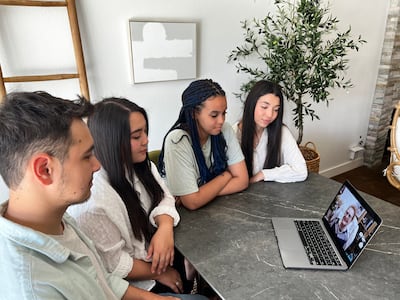In a plush, sun-drenched living room filled with modern, sleek furniture, a group of people huddle around a laptop to speak to their grandmother.
“How did becoming a grandparent change you?” one asks.
“It brought immense joy into my life,” says 87-year old Marina Smith, through what appears to be a live video call.
Ms Smith speaks seamlessly from her sofa, surrounded by flowers and family photos, smiling as she carefully considers each question she is asked.
“I enjoyed the company, going places and sharing. And the beautiful little things that would come out of a child’s life. And the simple trust in you. It’s very, very beautiful,” she adds.
The conversation, however, is not live.
The Holocaust campaigner from the UK actually died in June 2022 after a short illness.
The tender exchange above was made possible only by advances in artificial intelligence technology and the efforts of her son to document her life.
“It’s an opportunity to be a good ancestor,” Stephen Smith tells The National. “It’s like a living photo album you keep throughout your life. And like a photo album, it will survive you.”

Mr Smith, who lives in Los Angeles but is originally from Nottinghamshire in the UK, is an oral historian who has dedicated much of his life to the testimony of those who experienced extreme, historic events such as the Holocaust.
He is co-founder of the conversational AI video company StoryFile. He is also the son of Ms Smith.
A few months before she died, Mr Smith sat down to talk to his mother. He wanted to answer some lingering questions about his family history, as well as pass on her life story to his children.

“I interviewed her [on camera] over two days, two hours each day, and asked about 120 questions,” Mr Smith says. “I learnt things about her and her interests that I didn’t even know about.”
Mr Smith used his mother’s answers to create a conversational AI video of her, one that could listen to questions and talk back.
In the same way Ms Smith spoke to her grandchildren on a laptop after her death, she answered questions on a TV screen at her own funeral.
“What would you say at your funeral?” her son asked at the end of a touching service, which had been filled with loving tributes by friends and family members from around the world.
“I’m so pleased I met so many good people who influenced my life,” she replied. “I haven’t done everything right, but I’ve done the best I can with God’s help. I’m ready to go and be with him, for ever.”
All of the words were Ms Smith’s own and had been directly pulled from the interview conducted by her son. StoryFile does not use AI technology to put text that has been generated into people’s mouths.
Mr Smith said the experience was not strange at all and his only regret was not asking more questions during the interview.
“It was emotional. I think people were pleased to see her smile and hear her voice,” he says. “It didn’t feel spooky or like we were clinging on to her – it was natural.”
The technology works by recording participants as they answer questions about their lives. The answers are then uploaded to StoryFile’s cloud. The final product is an interactive video, ready to answer questions from loved ones as if they are having a normal conversation.
StoryFile has its own special studio for some users, but most people create their virtual self on a home computer. The idea is that future generations will be able to ask real questions and receive real answers about an ancestor’s personal story.

“There is going to be somebody that you don’t know yet, who is your great-great-great-grandchild, say, digging back into the past,” Mr Smith says. “You might be the key to information [they are looking for], you might know the family history or lineage, you might have stories they can dig into.”
The use of technology to reanimate the dead is not an entirely new phenomenon.
Long explored in science fiction, the concept recently became popular in the dystopian drama Black Mirror, created by Charlie Brooker.
In the ep isode Be Right Back, a young woman named Martha struggles to overcome her grief when her boyfriend Ash is killed in a car accident.
Martha, who finds out she is pregnant, recreates a digital version of Ash using data scraped from text messages, emails and videos. Ultimately she builds a synthetic, albeit imperfect, Ash who can walk and talk, and introduces him to their daughter.
While current technology does not allow for a carbon copy, humanoid version of oneself to be left behind for loved ones, in the digital space, things are moving quickly.
In April 2023, the South China Morning Post reported that a 24-year-old man in Shanghai had used AI to resurrect his grandmother to give him comfort after she died at 84 from coronavirus.
He used image software and old photos to create her face, and trained the AI to mimic her voice using recordings of their phone conversations.
Similarly, in South Korea, the company DeepBrain AI released a video that showed bereaved family members meeting and talking to loved ones who had passed away.
The word “griefbot” has sometimes been used online to describe such creations.
Also in South Korea, a mother burst into tears after being reunited with her seven-year-old daughter using virtual reality after the girl died from a blood disease.
“Mum, where have you been? Have you been thinking of me?” the daughter, Na-yeon, says.
“Always,” replies her mother, Jang Ji-sun.
The heart-rending footage struck a chord with many South Koreans, while highlighting the growing scope of possibilities for VR technology.
StoryFile does not currently offer its customers the ability to create a so-called griefbot, although Mr Smith says there might come a time in the future when they allow families to experiment with this.
But the technology can be imprecise. If there are secrets or finer details not picked up while gathering data, they would not be included in the bot and its subsequent personality.
“When you are a family member and you happen to know about grandpa’s blue Corvette, but grandpa didn’t talk about the blue Corvette [in his interview] … you feel like that secret has been lost a little,” Mr Smith says.
The demand for this technology stems from society’s difficulty in dealing with death, says psychologist and AI enthusiast Mike Brooks.

“Death, historically, was always final,” he tells The National. “But we have reached an inflection point in humanity, death is going to be different moving forward.”
Dr Brooks also envisions potential problems arising in the future, should griefbots become more commonplace.
He believes adverts could creep into the algorithm of such bots and worries about the trauma caused to a family should a bot’s data ever be lost.
For Mr Smith, while the technology he harnesses is all about preserving memories like those of his mother, he believes grief is an entirely personal journey.
“I don’t criticise anybody for creating a bot of their deceased family or friends,” he says. “If that is what helps you come to terms with it.”

